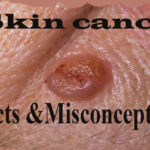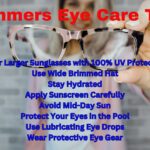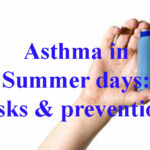Summer skin problems beside sunburn are many. To minimize the risk of heat related illness; try to avoid working or exercising in extreme heat.
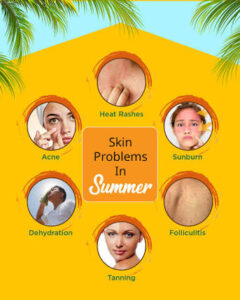

1. Heat rash or prickly heat or miliaria rubra:
Heat rash or prickly heat is a harmless but very itchy skin rash forming small as the armpit, back, under the breasts, chest, groin, crooks of elbows and knees and the waist. Heat rash is caused by a blockage and inflammation of sweat ducts in heat & high humidity which causes: Tiny red spots, An irritating itch & prickling sensation and Redness & mild swelling of the affected area.
2. Sun rash:
Some people have skin that can develop rashes with exposure to direct sunlight including people on certain antibiotics, or people exposed to some chemicals, fragrances, drugs or disinfectants. This is called photodermatitis. In some people exposure to the sun in the spring or in early summer can trigger an itchy, red rash on the front of the neck, chest, and the arms & thighs called polymorphous light (systemic lupus erythematosus or SLE) in susceptible people.
3. Skin allergies:
Spring and summer are times when there are many substances that can cause allergic skin reactions in the environment-moulds, pollens, plant, and animal substances.
1. Hives (urticaria) can be triggered by heat or sweat.
2. Eczema (atopic dermatitis) can worsen in the summer, especially with excess sweating.
3. Certain plants & grasses can cause skin rashes.
4. Acne breakouts:
When sweat mixes with bacteria and oils on your skin, it can clog your pores. If you have acne-pore skin this often means breakouts.
5. Folliculitis:
Every hair on your body grows out of an opening called a follicle. When follicles get infected you develop folliculitis, infected hair follicles look like pimples, but they tend to be itchy and tender.
6. Melasma:
Being out in the sun can make those brown to grey brown patches on your face more noticeable.
7. Impetigo:
It is one of the more common skin infections that peak in the warm weather months. It is usually due to a superficial bacterial infection and shows up as crusty or scabbed sores that sometimes seem to ”weep”. The crust sometimes has a honey like color. It is contagious & is treated with topical & oral antibiotics.
8. Sun burn:
This tends to occur when unprotected skin is exposed to the strong summer sun, most often between 10:00 AM and 4:00 PM. It tends to be most damaging in children with fair skin, fair hair and light eyes but can lead to premature aging of the skin and skin cancer in anyone.
Protect your health when temperatures are extremely high:
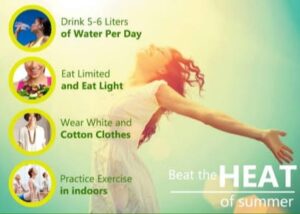

To minimize the risk of heat related illness; try to avoid working or exercising in extreme heat. Avoid dehydration and other complications by taking frequent breaks to get out of the heat, and drinking plenty of water or other fluids to replenish fluid lost through sweat. Early signs of heat related illness include lightheadedness, weakness and nausea. It is important to get out of the heat, cool off, and rehydrate immediately to avoid severe heat, or may need to be treated.
How much water should I drink in hot weather?
It is hard to gauge how much water is lost through sweat, and the thirst mechanism may not be sensitive enough to remind a person to drink enough. In general, the kidneys are a good guide to whether there is enough water in the body. If the body is dehydrated, the kidneys will try to hold on to as much water as possible. Decreased urine production, urine concentrated in color, and a strong urine odor are signs that the kidneys are trying to conserve the body’s water supply. Urine is clear when there is enough fluid in the body.
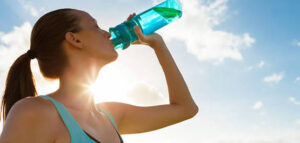

Prevention:
1. Avoid exercising in hot, humid weather.
2. Wear loose clothing made of breathable fabrics like cotton.
3. Keep the skin clean with frequent baths or showers to prevent sweat glands from becoming clogged.
4. The hot temperature can drain energy out of you it is important to consistently hydrate yourself to stay cool.
5. Avoid foods that will produce heat in your body and become hazardous .Try avoiding dark meats as they heat up your body.
6. Wash sweaty cloths, headbands, towels and hats before wearing them again.
7. Try to keep your skin cool by using fans, cool showers and air-conditioning when possible.
8. Avoid using oils or creams that would block the skin pore. Keep your body well hydrated.
Get a naturopathic diagnosis:
According to naturopathy, condition of the skin point to an imbalance in the body:
1. Oily skin (where the sebaceous glands become overactive) – try a liver detox/ diet.
2.. Excessively dry / flaky skin – deficiency of blood or body fluids & essential fatty acids.
3. Sweaty / clammy palms – irregularity of adrenal glands.
4. Cracked skin – lack of vitamins A & C, zinc & essential fatty acids.
5. Hard skin – lack of essential fatty acids.
6. Thin skin – can occur from long – term steroid use, bioflavonoid, especially rutin could help.


Dr Venkataramana Hegde & Dr.Nandhini V. Mohan
Veda wellness center
Nisarga Mane Sirsi
Uttarakannada District.
Ph: 9448729434 / 9597019032
Email : nisargamane6@gmail.com





